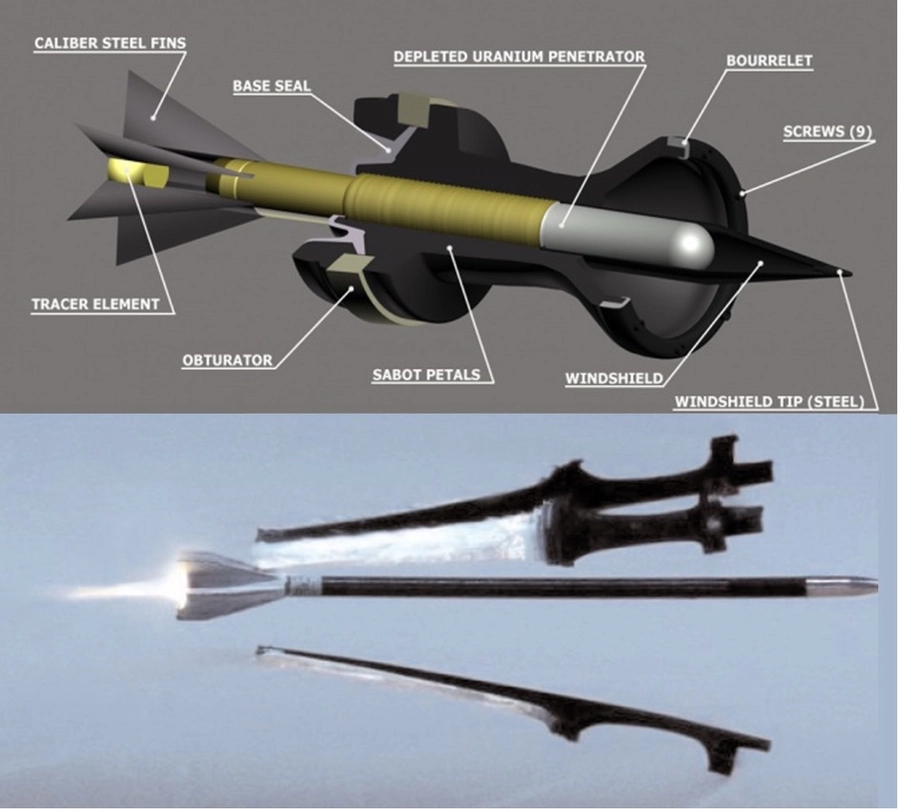Russia has responded furiously to news that the US will provide Ukraine with depleted uranium tank ammunition, part of a $1 billion military humanitarian aid package announced on Wednesday.
What has the Kremlin said?
JOIN US ON TELEGRAM
Follow our coverage of the war on the @Kyivpost_official.
The US decision “is a clear sign of inhumanity,” the Russian embassy said on Telegram.
“Washington, obsessed with the idea of inflicting a 'strategic defeat' on Russia, is ready to fight not only to the last Ukrainian but to put a cross on the future generations.
"The US is deliberately transferring weapons with indiscriminate effects. It is fully aware of the consequences: explosions of such munitions result in the formation of a moving radioactive cloud."
Topping it off, the embassy finished by saying that in supplying the rounds, the US was “deeply indifferent to both the present of Ukraine and the future of the republic and its European neighbors.”
Isn’t that a bit ironic?
Just a little given Moscow’s unprovoked full-scale invasion of a neighboring country that sparked the largest land war since World War 2, that has killed hundreds of thousands of people, posed the biggest threat to European and world security in decades and been on the edge of a nuclear disaster multiple times.
In an attempt to hammer home the point even further, on Thursday afternoon, Kremlin spokesman Dmitry Peskov said:"This is very bad news,"

Moldova Residents Caught in the Middle of Gas Fight
"The use of these shells has resulted in a galloping increase in the number of cancer patients ... The same situation will inevitably await those Ukrainian territories where they will be used."
Are Russia’s concerns being taken seriously?
Nope. The 120-millimetre rounds are for M1 Abrams tanks that are expected to be delivered to Ukraine before the end of 2023.
Why is Russia actually upset?
In short, because it means Ukraine will be able to destroy even more of their tanks.
What is depleted uranium (DU)?
Uranium is found in trace amounts in all rocks and soil, in water and air, and in materials made from natural substances. It is a reactive metal, and, therefore, it is not present as free uranium in the environment.
In order to produce fuel for nuclear reactors and nuclear weapons, uranium has to be “enriched” by increasing the levels of the Uranium 235 isotope, which is responsible for nuclear fission.
Depleted uranium is a by-product of the enrichment of natural uranium to make nuclear fuel. It is far less radioactive than naturally occurring uranium as it contains less of the fissionable material.
Uranium is an extremely dense metal, 1.7 times denser than lead, and this lends itself to uses where a large mass in a small volume is advantageous. It’s uses included as shielding material in nuclear reactors, counterweights in aircraft as well as its use in munitions.
Why use DU in ammunition?
It is militarily attractive because there is lots of it. In 1998 the U.S. had about 500,000 metric tons of depleted uranium in storage. DU and other dense materials such as tungsten, are attractive as penetrators for use against tanks and other armored vehicles.
Fired at high velocity, its momentum and straight trajectory makes it almost impossible to stop.
DU has greater target penetration than tungsten and is pyrophoric. As a DU penetrator strikes a target, its surface temperature increases dramatically, the surface melts and is shed which keeps the tip sharp and prevents the mushrooming effect that occurs with tungsten.
As the DU penetrates the target vehicle, the flaking of burning fragments will shred whatever is inside the tank and ignite the vehicle’s fuel and ammunition; what the military term “behind-the-target effectiveness.”
Does DU pose a health and environmental threats?
DU is a heavy metal and, like other heavy metals such as mercury, lead and tungsten, is chemically toxic if ingested in high doses. DU that remains outside the body is not harmful.
However, after being fired and “cooking off” in an attack, it may pose a long-term health hazard to personnel if DU fragments or dust-like particles enter the body through wounds or if breathed in.
What about the risk of radiation from DU?
Under most exposure scenarios there is negligible radiation risk. DU is 40% less radioactive than naturally occurring uranium. The majority of the radiation it produces, alpha and beta particles, are blocked by the skin or normal clothing.
The amount of highly penetrating gamma rays emitted by depleted uranium is very low.
Thus, depleted uranium does not significantly add to the background radiation that we encounter every day.
You can also highlight the text and press Ctrl + Enter











